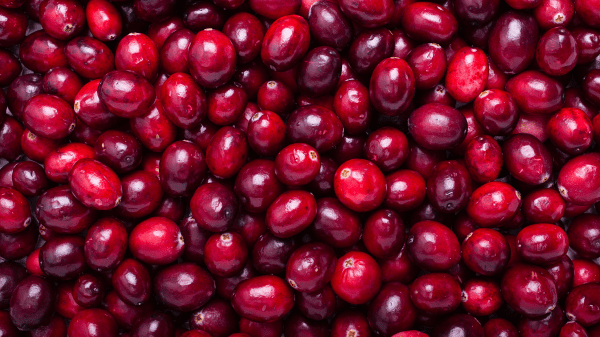From September 1, 2021 to August 31, 2022, the U.S. exported 332,167 100-pound barrels of cranberries to Latin America, with Colombia being the second largest destination country in the region, accounting for 12.5 percent of total exports, according to Nation World News.

Colombia has increased its consumption of cranberries and the figures show it, with exports of this native superfruit from the U.S. increasing by 80 percent from 23,020 to 41,451 100-pound barrels from 2017/18 to 2021/22.
Colombia is a long-term market for the U.S. industry with export shipments since 2003/04. However, volumes have increased in recent years and are expected to continue and increase exports by at least 15 percent.
The U.S. Cranberry Marketing Committee, known as the CMC, represents all cranberry growers and distributors in the country. CMC members know that Colombia is at the forefront of the latest culinary trends and that Colombian consumers have enthusiastically embraced cranberries, especially in specialty culinary regions in our country along with an effort to reach the homes of Colombians.
“We aim that Colombians, both in the gastronomic industry and the end consumer, know more about our native ‘superfruit’ from the U.S.; Its unique taste, its health benefits and its versatility in cooking. We want Colombians to increasingly include cranberries in their markets,” said Danny Raulerson, executive director of CMC.
Cranberry production in the U.S. is projected to reach a total of 7,833,267 100-pound barrels in 2022/23. Between September 1, 2021 to August 31, 2022, 53 percent of the production was exported. In recent years, these have fluctuated from 30-53 percent of production.
Cranberries are considered America’s original superfruit. It is native to the country and one of three commonly grown fruits that originated in North America, so it has strong ties to American history.
Cranberries require very specific conditions for their production and harvest, including very low temperatures to develop fruit. They are grown only in the U.S. (bordering Canada), primarily in the northern states of Wisconsin, Massachusetts, Oregon, New Jersey, and Washington. Colombia, being a tropical country, does not have the necessary climatic conditions to naturally produce cranberries.
Cultivation and harvesting are done in the autumn, usually from mid-September to mid-November in the bogs. They are then taken to local processing plants to be turned into dried cranberries, juice, and other products. Thereafter, these are distributed nationally and internationally for sale.
Cranberries are produced and marketed by more than 1,100 small family farmers, ranging from the fourth, fifth and sixth generations.
Cranberry production is also highly sustainable. Although its cultivation requires a significant amount of water, it is recycled on site and reused year after year. Additionally, for every acre of cranberry bog, 5.5 acres of wooded bog are needed to surround it, to ensure wetland protection.



